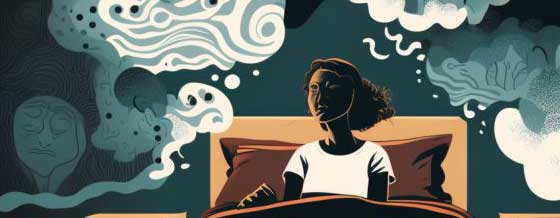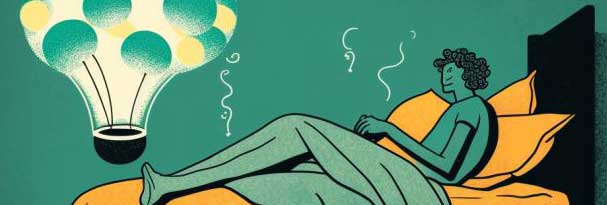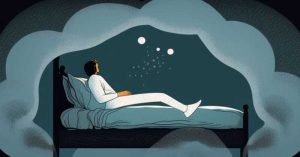Waking up at 3 a.m., or in the early hours, is a common issue many people experience. This sudden awakening can disrupt your sleep cycle, leaving you groggy and exhausted the following day.
It is essential to understand that waking up at 3 a.m. is not a phenomenon isolated to a specific group of individuals; it can affect people of all ages and lifestyles. Identifying and addressing the underlying causes can significantly improve sleep quality and overall well-being.
Contents
Various factors can contribute to waking up at 3 a.m., including biological, environmental, psychological, sleep disorders, lifestyle, and medication-related causes. Understanding the root cause of your disrupted sleep is essential in determining the appropriate treatment and preventative measures. In this article, we will explore the common reasons for waking up at 3 a.m. and provide practical guidance on addressing these issues, ultimately helping you achieve a more restful and rejuvenating sleep experience.
Causes of Waking Up at 3 a.m.
Biological Factors
Various biological factors may contribute to waking up at 3 a.m. These factors can range from regular sleep cycles to hormonal imbalances and nocturia. Understanding these physical factors can help identify potential issues and seek appropriate treatments or adjustments to your lifestyle.
- Sleep Cycles and REM Sleep
 Our bodies operate on a natural sleep-wake cycle known as the circadian rhythm. This rhythm consists of several sleep stages, including non-rapid eye movement (NREM) sleep and rapid eye movement (REM) sleep. Waking up at 3 a.m. could be attributed to the transition between these sleep stages, particularly if you are experiencing REM sleep, which is often associated with vivid dreams and heightened brain activity.
Our bodies operate on a natural sleep-wake cycle known as the circadian rhythm. This rhythm consists of several sleep stages, including non-rapid eye movement (NREM) sleep and rapid eye movement (REM) sleep. Waking up at 3 a.m. could be attributed to the transition between these sleep stages, particularly if you are experiencing REM sleep, which is often associated with vivid dreams and heightened brain activity.
During a night’s sleep, we typically cycle through these stages multiple times. If you wake up during a particular scene, such as REM sleep, it may cause you to feel more alert and struggle to return to sleep.
- Hormonal Imbalances
Hormonal imbalances can also play a role in disrupting sleep patterns and causing you to wake up at 3 a.m. One of the essential hormones involved in sleep regulation is cortisol, commonly known as the „stress hormone.“ Cortisol levels typically decrease during the evening, allowing the body to relax and prepare for sleep. However, if cortisol levels remain elevated due to stress or other factors, it can make it difficult to fall asleep or cause you to wake up in the middle of the night.
Another hormone that can impact sleep is melatonin, which helps regulate the sleep-wake cycle. If melatonin production is disrupted or imbalanced, it may cause difficulties in falling or staying asleep throughout the night.
- Nocturia (Frequent Nighttime Urination)
Nocturia, or the need to urinate frequently during the night, can be another biological factor that causes you to wake up at 3 a.m. Various factors, including aging, certain medications, underlying medical conditions, and excessive fluid intake before bedtime, can cause nocturia.
Waking up to use the bathroom can disrupt your sleep cycle, making it difficult to return to sleep after you’ve gotten up. Addressing the underlying causes of nocturia and adjusting your bedtime habits, such as reducing fluid intake in the evening, can help minimize sleep disruptions and improve overall sleep quality.
Environmental Factors
Environmental factors can also contribute to waking up at 3 a.m. Noise disturbances, light exposure, and room temperature can all impact the quality of your sleep and disrupt your sleep cycles. Addressing these factors can create a sleep environment that promotes restful and uninterrupted sleep.
- Noise Disturbances
 Noise disturbances can originate from internal and external sources, such as snoring, noisy neighbors, or street noise. Even if you don’t fully wake up, these disturbances can disrupt your sleep cycles and lead to fragmented sleep. Over time, this can contribute to a pattern of waking up at 3 a.m. or other times during the night.
Noise disturbances can originate from internal and external sources, such as snoring, noisy neighbors, or street noise. Even if you don’t fully wake up, these disturbances can disrupt your sleep cycles and lead to fragmented sleep. Over time, this can contribute to a pattern of waking up at 3 a.m. or other times during the night.
To minimize noise disturbances, consider using earplugs or a white noise machine to help drown out unwanted sounds. Additionally, soundproofing your bedroom by sealing gaps around windows and doors or adding sound-absorbing materials like curtains and rugs can help create a more peaceful sleep environment.
- Light Exposure
Exposure to artificial light, the mainly blue light emitted from electronic devices, can interfere with the production of melatonin, the hormone that regulates sleep. Using electronic devices close to bedtime or sleeping in a room with excess light can lead to difficulties falling asleep or staying asleep, potentially causing you to wake up at 3 a.m.
To reduce the impact of light exposure on your sleep, consider using blackout curtains or an eye mask to block out light sources in your bedroom. Also, establish a screen-free routine at least an hour before bedtime to help promote melatonin production and signal your body that it’s time for sleep.
- Room Temperature and Bedding
An optimal sleep environment includes a comfortable room temperature and appropriate bedding. Studies have shown that the ideal room temperature for sleep is between 60 and 67 degrees Fahrenheit (15 to 19 degrees Celsius). Sleeping in a room that is too hot or cold can cause restlessness and make it difficult to stay asleep throughout the night.
Similarly, uncomfortable bedding or pillows can contribute to disrupted sleep. Choose bedding materials that promote breathability and regulate temperatures, such as moisture-wicking fabrics or natural fibers like cotton or linen. Additionally, ensure your pillow supports your head and neck correctly to prevent discomfort and maintain proper spinal alignment during sleep.
By addressing these environmental factors, you can create a sleep sanctuary that supports restful and uninterrupted sleep, reducing the likelihood of waking up at 3 a.m.
Psychological Factors
 Psychological factors can significantly impact sleep quality and contribute to waking up at 3 a.m. Stress, anxiety, depression, and sleep disturbances such as nightmares or sleep paralysis can all interfere with falling and staying asleep. Understanding and addressing these factors can help improve sleep and reduce nighttime awakenings.
Psychological factors can significantly impact sleep quality and contribute to waking up at 3 a.m. Stress, anxiety, depression, and sleep disturbances such as nightmares or sleep paralysis can all interfere with falling and staying asleep. Understanding and addressing these factors can help improve sleep and reduce nighttime awakenings.
- Stress and Anxiety
Stress and anxiety can activate the body’s „fight or flight“ response, making it difficult to relax and fall asleep. When experiencing stress or anxiety, the body releases cortisol and adrenaline, which can disrupt sleep cycles and lead to waking up at 3 a.m. or other times during the night.
To manage stress and anxiety before bedtime, try incorporating relaxation techniques such as deep breathing exercises, progressive muscle relaxation, or meditation. Establishing a calming bedtime routine and creating a sleep environment free of stressors, such as work or electronic devices, can also promote better sleep.
- Depression
Depression can cause a variety of sleep disturbances, including insomnia and early morning awakenings. Individuals with depression may wake up at 3 a.m., struggling to fall back asleep and experiencing excessive daytime sleepiness. It can create a vicious cycle, as poor sleep can exacerbate depressive symptoms.
If you suspect that depression may be affecting your sleep, it’s essential to consult with a mental health professional for proper diagnosis and treatment. Depending on the severity and individual needs, treatment options may include therapy, medication, or a combination.
- Nightmares and Sleep Paralysis
Nightmares and sleep paralysis can cause abrupt awakenings and make it difficult to fall back asleep. Nightmares are vivid, disturbing dreams that can cause fear or anxiety, leading to waking up during the night. Sleep paralysis is a temporary inability to move or speak while falling asleep or waking up, often accompanied by intense fear or hallucinations.
To reduce the occurrence of nightmares, maintain a consistent sleep schedule, and create a relaxing bedtime routine. Limit exposure to stressful or stimulating content before bed, such as violent movies or news reports. For sleep paralysis, practicing good sleep hygiene and managing stress may reduce its frequency.
Addressing psychological factors contributing to waking up at 3 a.m. is crucial for improving sleep quality and overall well-being. Working with a mental health professional can provide valuable guidance and support in managing these issues.
Sleep Disorders
 Sleep disorders are another significant factor that can cause waking up at 3 a.m. and impact overall sleep quality. Insomnia, sleep apnea, and restless leg syndrome are common sleep disorders that can lead to frequent nighttime awakenings. Recognizing and treating these conditions is essential for achieving restorative sleep and improving overall health.
Sleep disorders are another significant factor that can cause waking up at 3 a.m. and impact overall sleep quality. Insomnia, sleep apnea, and restless leg syndrome are common sleep disorders that can lead to frequent nighttime awakenings. Recognizing and treating these conditions is essential for achieving restorative sleep and improving overall health.
- Insomnia
Insomnia is a prevalent sleep disorder characterized by difficulty falling asleep, staying asleep, or experiencing non-restorative sleep. Insomnia can lead to waking up at 3 a.m., struggling to fall back asleep, and feeling tired throughout the day. Various factors can contribute to insomnia, including stress, medical conditions, and poor sleep habits.
Treatment for insomnia often begins with improving sleep hygiene, which involves creating a consistent sleep schedule, establishing a relaxing bedtime routine, and optimizing the sleep environment. In some cases, cognitive-behavioral therapy for insomnia (CBT-I) or medication may be recommended under the guidance of a healthcare professional.
- Sleep Apnea
Sleep apnea is a sleep disorder characterized by repeated pauses in breathing during sleep, often resulting in snoring, choking, or gasping for air. These breathing interruptions can cause frequent awakenings throughout the night, including waking up at 3 a.m. Sleep apnea can lead to significant health complications if left untreated, such as high blood pressure, heart problems, and stroke.
Treatment for sleep apnea typically begins with lifestyle changes, such as weight loss, avoiding alcohol and sedatives, and changing sleep positions. Continuous positive airway pressure (CPAP) therapy is a standard and effective treatment for moderate to severe sleep apnea, which involves wearing a mask connected to a machine that delivers pressurized air to keep the airways open during sleep. Consultation with a sleep specialist is necessary to diagnose and adequately treat sleep apnea.
- Restless Leg Syndrome
Restless leg syndrome (RLS) is a neurological disorder characterized by an uncomfortable sensation in the legs and an irresistible urge to move them. Symptoms of RLS typically worsen during the evening and night, often disrupting sleep and causing awakenings, including at 3 a.m.
Managing RLS may involve:
- Implementing lifestyle changes, such as regular exercise.
- A consistent sleep schedule.
- Limiting caffeine and alcohol intake.
In some cases, medication may be prescribed to help alleviate symptoms. It is essential to consult with a healthcare professional for proper diagnosis and treatment of RLS.
 Addressing sleep disorders is crucial for improving sleep quality and overall health. If you suspect that a sleep disorder may be causing you to wake up at 3 a.m., consult with a healthcare professional or sleep specialist to determine the appropriate course of action.
Addressing sleep disorders is crucial for improving sleep quality and overall health. If you suspect that a sleep disorder may be causing you to wake up at 3 a.m., consult with a healthcare professional or sleep specialist to determine the appropriate course of action.
Lifestyle Factors
Lifestyle factors are critical in influencing sleep patterns and may contribute to waking up at 3 a.m. Diet and eating habits, alcohol and caffeine consumption, and exercise routines can significantly impact sleep quality. By understanding the relationship between these factors and sleep, individuals can make informed decisions to improve their sleep quality and overall well-being.
- Diet and Eating Habits
The foods we consume and the timing of our meals can significantly affect our sleep. Consuming large or heavy meals close to bedtime may cause discomfort and disrupt sleep, leading to waking up at 3 a.m. Spicy or fatty foods, for example, can cause heartburn or indigestion, making it difficult to fall asleep or stay asleep.
To promote better sleep, consider eating lighter meals in the evening and allowing ample time for digestion before bedtime. Incorporating foods rich in sleep-promoting nutrients, such as magnesium, tryptophan, and melatonin, can also be beneficial. Examples include almonds, turkey, and tart cherries.
- Alcohol and Caffeine Consumption
Alcohol and caffeine are common substances that can interfere with sleep quality. While alcohol may initially induce drowsiness, it can disrupt the sleep cycle, leading to more frequent awakenings, such as waking up at 3 a.m. On the other hand, caffeine is a stimulant that can make it difficult to fall asleep or stay asleep, especially when consumed in the late afternoon or evening.
 To improve sleep, it is advisable to limit alcohol and caffeine intake, particularly in the hours leading up to bedtime. Opt for non-caffeinated beverages, such as herbal teas or warm milk, in the evening to help promote relaxation and sleepiness.
To improve sleep, it is advisable to limit alcohol and caffeine intake, particularly in the hours leading up to bedtime. Opt for non-caffeinated beverages, such as herbal teas or warm milk, in the evening to help promote relaxation and sleepiness.
- Exercise Routines
Regular physical activity is essential for overall health and can contribute to improved sleep quality. Exercise helps regulate the body’s natural sleep-wake cycle and reduces stress and anxiety, which can often factor into sleep disturbances. However, engaging in high-intensity activity too close to bedtime may have the opposite effect. It can raise body temperature and stimulate the release of adrenaline, making it difficult to fall asleep or causing nighttime awakenings.
Aim to engage in regular physical activity during the day or early evening to optimize the benefits of exercise on sleep. Incorporating yoga or stretching into your evening routine can promote relaxation and prepare the body for sleep.
By considering the impact of lifestyle factors on sleep, individuals can make adjustments to promote restorative sleep and reduce the likelihood of waking up at 3 a.m.
Medication Side Effects
Medications prescribed for various health conditions can sometimes cause unintended side effects that disrupt sleep, leading to instances of waking up at 3 a.m. Antidepressants, ADHD medications, and other medications may interfere with sleep quality and duration, affecting the overall well-being of individuals. Understanding how these medications impact sleep is essential to ensure proper management and treatment of sleep disturbances.
- Antidepressants
Antidepressants are commonly prescribed for individuals with depression and other mood disorders. Some antidepressants, particularly selective serotonin reuptake inhibitors (SSRIs) and serotonin-norepinephrine reuptake inhibitors (SNRIs) may cause sleep disturbances as a side effect. These medications can affect the balance of neurotransmitters in the brain, which are crucial for regulating sleep.
If you suspect your antidepressant medication is causing sleep disruptions, consult your healthcare provider. They may recommend adjusting the dosage, changing the timing of the drug, or exploring alternative treatment options.
- ADHD Medications
Attention-deficit/hyperactivity disorder (ADHD) medications, such as stimulants like methylphenidate and amphetamine, can cause sleep disruptions as a side effect. These medications increase alertness and focus by stimulating the central nervous system, which can make it difficult to fall asleep or stay asleep.
If you are experiencing sleep difficulties due to ADHD medications, speak with your healthcare provider. They may suggest adjusting the dosage, switching to a different medication, or implementing a structured sleep routine to minimize the impact on your sleep quality.
- Other Medications Disrupting Sleep
 Various other medications can potentially disrupt sleep, including:
Various other medications can potentially disrupt sleep, including:
- Beta-blockers, which are prescribed for high blood pressure and heart conditions
- Corticosteroids, used to treat inflammation and autoimmune disorders
- Diuretics, prescribed for fluid retention and high blood pressure
- Hormone replacement therapy, which can cause hot flashes and night sweats
If you believe your sleep disturbances are related to your medication, consult your healthcare provider. They can review your medication regimen, discuss potential side effects, and explore alternative treatments or adjustments to minimize sleep disruptions.
Treatment and Prevention Strategies
Improve the Sleep Environment
Creating an optimal sleep environment is crucial to addressing sleep disturbances, including waking up at 3 a.m. Individuals can improve their overall sleep quality and duration by minimizing external factors that can disrupt sleep. This section will outline several strategies to enhance the sleep environment, including reducing noise and light exposure, optimizing room temperature and bedding, and establishing a relaxing bedtime routine.
- Reduce Noise and Light Exposure
Noise and light exposure can significantly impact sleep quality. To minimize disruptions caused by noise, consider using earplugs, a white noise machine, or a fan to drown out external sounds. Additionally, ensure that windows and doors are correctly sealed to reduce noise transmission.
Light exposure can also disrupt the body’s natural sleep-wake cycle, making it more challenging to fall asleep or maintain sleep throughout the night. To minimize light exposure, use blackout curtains or shades to block outdoor light, and avoid using electronic devices with bright screens before bedtime. Alternatively, consider wearing a sleep mask to block out any residual light.
- Optimize Room Temperature and Bedding
The ideal room temperature for sleeping varies from person to person but is generally around 60-67°F (15-19°C). Maintaining a comfortable room temperature can promote restful sleep and prevent disruptions during the night. Use a programmable thermostat or a fan to regulate the temperature in your bedroom, and adjust your bedding according to the season to ensure optimal comfort.
Investing in high-quality bedding can also make a significant difference in sleep quality. Choose a mattress, pillows, and sheets that provide adequate support and comfort, tailored to your preferences and sleep position.
- Establish a Relaxing Bedtime Routine
Creating a consistent and relaxing bedtime routine can signal the body that it’s time to wind down and prepare for sleep. Some practical activities to incorporate into your bedtime routine include:
- Reading a book or listening to calming music
- Practicing relaxation techniques, such as deep breathing exercises or progressive muscle relaxation
- Engaging in gentle stretching or yoga
- Taking a warm bath or shower
 Establishing a regular sleep schedule and adhering to it, even on weekends, can also help regulate the body’s internal clock, making it easier to fall asleep and wake up at consistent times.
Establishing a regular sleep schedule and adhering to it, even on weekends, can also help regulate the body’s internal clock, making it easier to fall asleep and wake up at consistent times.
In conclusion, improving the sleep environment is essential in addressing sleep disturbances, including waking up at 3 a.m. By implementing these strategies, individuals can enhance their sleep quality and reduce the likelihood of sleep disruptions.
Address Psychological Factors
Psychological factors, such as stress, anxiety, and depression, can significantly impact sleep patterns and contribute to waking up at 3 a.m. Developing strategies to address these issues can improve sleep quality and overall well-being. This section will discuss stress management techniques, therapy or counseling for anxiety and depression, and mindfulness and relaxation exercises.
- Stress Management Techniques
Managing stress is essential for maintaining healthy sleep patterns. Effective stress management techniques vary from person to person, but some standard practices include the following:
- Regular exercise: Engaging in physical activity can help reduce stress levels and improve sleep quality. Aim for at least 150 minutes of moderate-intensity weekly exercise, such as brisk walking, swimming, or cycling.
- Time management: Developing time management skills and setting priorities can help alleviate stress and prevent overwhelming feelings. Create a daily schedule, break tasks into smaller steps, and set realistic goals.
- Social support: Building and maintaining a solid support network can help reduce stress levels. Contact friends, family, or support groups for emotional assistance and encouragement.
- Therapy or Counseling for Anxiety and Depression
Anxiety and depression can significantly impact sleep quality, and addressing these issues through therapy or counseling can lead to better sleep patterns. In particular, cognitive-behavioral therapy (CBT) effectively treats insomnia related to anxiety and depression. CBT focuses on identifying and modifying negative thought patterns and behaviors contributing to sleep disturbances.
To find a qualified therapist or counselor, consult your healthcare provider or seek recommendations from trusted sources. Online therapy platforms have also become increasingly popular, providing convenient and accessible mental health support.
- Mindfulness and Relaxation Exercises
Incorporating mindfulness and relaxation exercises into your daily routine can help reduce stress, anxiety, and depression, improving sleep quality. Some techniques to consider include the following:
- Meditation: Regular meditation practice can help increase relaxation and reduce stress. Guided meditation apps or recordings can be helpful for beginners.
- Progressive muscle relaxation (PMR): PMR involves systematically tensing and relaxing specific muscle groups, promoting comprehensive peace. Practice PMR before bedtime to create a sense of calm and prepare your body for sleep.
- Deep breathing exercises: Focusing on slow, deep breaths can help reduce stress and promote relaxation. Try the 4-7-8 breathing technique, which involves inhaling for four counts, holding the breath for seven counts, and exhaling for eight counts.
By addressing psychological factors and incorporating these strategies into your daily life, you can improve sleep quality and reduce the likelihood of waking up at 3 a.m. Remember, it’s essential to seek professional help if psychological issues persist or worsen, as they can significantly impact your overall well-being.
Manage Sleep Disorders
Effectively managing sleep disorders is crucial for individuals who wake up at 3 a.m. and experience difficulty falling back asleep. This section will discuss the importance of consulting with a sleep specialist and receiving appropriate treatment for specific sleep disorders.
- Consultation with a Sleep Specialist
If you suspect that a sleep disorder is causing you to wake up at 3 a.m., it is essential to consult with a sleep specialist. A sleep specialist is a medical professional with specialized training in diagnosing and treating sleep disorders. They can evaluate your sleep patterns, medical history, and lifestyle to determine the underlying cause of your sleep disruptions.
During your consultation, be prepared to discuss your sleep habits, symptoms, and potential triggers. The sleep specialist may also recommend a sleep study, known as polysomnography, to monitor your brain activity, eye movements, and other physiological functions during sleep. This test can help identify specific sleep disorders, such as sleep apnea, restless legs syndrome, or periodic limb movement disorder.
- Appropriate Treatment for Specific Sleep Disorders
 Once a sleep disorder has been diagnosed, it’s crucial to receive appropriate treatment to address the underlying issue and improve sleep quality. Treatment options vary depending on the specific sleep disorder, but some common approaches include the following:
Once a sleep disorder has been diagnosed, it’s crucial to receive appropriate treatment to address the underlying issue and improve sleep quality. Treatment options vary depending on the specific sleep disorder, but some common approaches include the following:
- Sleep apnea: Continuous positive airway pressure (CPAP) therapy, dental devices, or surgery may be recommended to alleviate symptoms and improve sleep quality.
- Restless legs syndrome: Medications like dopamine agonists or alpha-2 agonists can help manage symptoms. Iron supplementation may also be beneficial if low iron levels contribute to the condition.
- Periodic limb movement disorder: Medications, such as benzodiazepines or dopamine agonists, may be prescribed to reduce symptoms and improve sleep quality.
By working closely with a sleep specialist and following the prescribed treatment plan, individuals can address the underlying sleep disorder and reduce the likelihood of waking up at 3 a.m. Remember, managing sleep disorders is vital for restorative sleep and overall health and well-being.
Adjust Lifestyle Factors
Adjusting lifestyle factors is an essential step in addressing the issue of waking up at 3 a.m. and enhancing sleep quality. In this section, we will discuss various strategies, including establishing a consistent sleep schedule, modifying diet, and eating habits, limiting alcohol and caffeine intake, and exercising earlier in the day.
- Establish a Consistent Sleep Schedule
Creating and maintaining a consistent sleep schedule promotes better sleep quality. Going to bed and waking up at the same time every day, even on weekends, helps regulate the body’s internal clock, known as the circadian rhythm. This consistency makes it easier to fall asleep and stay asleep throughout the night. To establish a regular sleep schedule, determine a bedtime that allows for 7-9 hours of sleep each night, and make it a priority to stick to this schedule as closely as possible.
- Modify Diet and Eating Habits
Diet and eating habits can significantly impact sleep quality. Eating large meals or spicy foods too close to bedtime can cause discomfort and indigestion, making it difficult to fall or stay asleep. To promote better sleep, try eating lighter meals in the evening and avoid consuming heavy or spicy foods within three hours of bedtime. Additionally, foods rich in tryptophan, magnesium, and melatonin, such as turkey, almonds, and tart cherries, can help support a restful night’s sleep.
- Limit Alcohol and Caffeine Intake
Both alcohol and caffeine can interfere with sleep quality. While alcohol might help you fall asleep initially, it can disrupt sleep during the night, leading to more frequent awakenings. On the other hand, caffeine is a stimulant that can make it difficult to fall asleep and cause restlessness at night. To improve sleep, limit alcohol consumption, especially in the evening, and avoid caffeine intake within six hours of bedtime.
- Exercise Earlier in the day
Regular physical activity has numerous health benefits, including improved sleep quality. However, the timing of exercise can influence its impact on sleep. Engaging in vigorous exercise too close to bedtime can stimulate the body and make it challenging to fall asleep. To reap the sleep-promoting benefits of exercise, try scheduling workouts earlier in the day, ideally in the morning or afternoon. This approach allows the body to wind down and relax before bedtime, making it easier to fall asleep and stay asleep throughout the night.
Review Medications
Medications can sometimes contribute to sleep disturbances, including waking up at 3 a.m. Reviewing medications and discussing potential side effects with a healthcare provider is essential. In this section, we will explore the importance of discussing medication side effects, considering alternative medicines or dosage adjustments, and avoiding self-medication with sleep aids.
- Discuss Medication Side Effects with a Healthcare Provider
Some prescription and over-the-counter medications can cause sleep disturbances as a side effect. It is crucial to discuss any potential sleep-related side effects of your drugs with your healthcare provider. They can help determine whether the medication contributes to your sleep issues and recommend appropriate steps to address the problem.
- Consider Alternative Medications or Dosage Adjustments
If a medication is identified as the cause of sleep disturbances, your healthcare provider may suggest alternative medications or dosage adjustments. These changes can help alleviate sleep issues while addressing the underlying health condition. It is essential to follow your healthcare provider’s advice and only make changes to your medication regimen with their guidance.
- Avoid Self-Medication with Sleep Aids
While over-the-counter sleep aids might seem like a quick fix for sleep disturbances, self-medication can lead to dependence, tolerance, and other adverse effects. Moreover, sleep aids might not address the underlying cause of the sleep problem. Instead of self-medicating, consult your healthcare provider for a comprehensive evaluation and personalized treatment plan. They can recommend appropriate therapies or interventions, including prescription sleep aids, to address your sleep issues effectively and safely.
When to Seek Professional Help
Sometimes, sleep disturbances such as waking up at 3 a.m. might indicate a more serious issue. It is crucial to recognize when professional help is necessary and understand the benefits of early intervention. In this section, we will discuss indications that sleep issues require medical attention, the role of a primary care provider or sleep specialist, and the benefits of early intervention for sleep problems.
Indications that Sleep Issues Require Medical Attention
There are several signs that sleep disturbances might warrant professional help, including:
- Persistent sleep problems lasting for several weeks or months
- Excessive daytime sleepiness, impacting daily functioning and safety
- Difficulty falling asleep, staying asleep, or waking up too early despite adhering to good sleep hygiene practices
- Loud, irregular snoring accompanied by pauses in breathing or gasping for air
- Restless legs or other uncomfortable sensations that disrupt sleep
- Sleepwalking, night terrors, or other parasomnias
If you experience any of these symptoms or are concerned about your sleep quality, it is essential to consult a healthcare professional.
The Role of a Primary Care Provider or Sleep Specialist
 A primary care provider can assess your sleep problems, review your medical history, and recommend appropriate diagnostic tests or referrals to specialists, such as a sleep specialist. A sleep specialist is a healthcare professional with expertise in diagnosing and treating sleep disorders. They may conduct a comprehensive sleep evaluation, which could include an overnight sleep study (polysomnography) to monitor your sleep and identify any issues.
A primary care provider can assess your sleep problems, review your medical history, and recommend appropriate diagnostic tests or referrals to specialists, such as a sleep specialist. A sleep specialist is a healthcare professional with expertise in diagnosing and treating sleep disorders. They may conduct a comprehensive sleep evaluation, which could include an overnight sleep study (polysomnography) to monitor your sleep and identify any issues.
Benefits of Early Intervention for Sleep Problems
Addressing sleep problems early on can have numerous benefits, including:
- Improved sleep quality and overall health: Early intervention can help resolve sleep disturbances, leading to better sleep and improved physical and mental health.
- Enhanced daily functioning: Addressing sleep issues can reduce daytime sleepiness, improve concentration and productivity, and decrease the risk of accidents or injuries.
- Reduced risk of long-term complications: Untreated sleep disorders can contribute to chronic health issues, such as cardiovascular disease, diabetes, and obesity. Early intervention can help minimize these risks.
- Improved mental well-being: Sleep disturbances can exacerbate anxiety, depression, and stress. By addressing sleep issues, individuals may experience an improvement in their emotional and mental well-being.
In conclusion, it is vital to recognize when professional help is necessary for sleep disturbances and to seek early intervention for the best possible outcomes.
Conclusion
In this article, we have explored the leading causes and treatments for waking up at 3 a.m., emphasizing the importance of addressing sleep issues and seeking help when necessary for improved sleep and overall well-being.
Some common causes of waking up at 3 a.m. include stress and anxiety, sleep disorders, lifestyle factors, and medication side effects. Various strategies can address these issues, such as stress reduction techniques, seeking consultation with a sleep specialist, adjusting lifestyle factors, and discussing medication side effects with a healthcare provider.
Addressing sleep issues is crucial for maintaining physical and mental health and enhancing daily functioning and well-being. By identifying and tackling the underlying causes of sleep disturbances, individuals can significantly improve their sleep quality and overall quality of life.
Sources with Links: The National Sleep Foundation; * The American Academy of Sleep Medicine; * The National Institute of Neurological Disorders and Stroke; * The Centers for Disease Control and Prevention – Sleep and Sleep Disorders.
It is essential to seek professional help when sleep issues persist, worsen, or significantly impact daily life. Early intervention by a primary care provider or sleep specialist can lead to better sleep, reduced risk of long-term complications, and improved mental well-being.
We encourage you to share this article on social media to raise awareness about the importance of addressing sleep issues and the various strategies to help individuals improve their sleep quality. By doing so, you can contribute to fostering a healthier and more well-rested community.

Marta Savova is a journalist, health, technolgy and science writer. With over 20 years of experience in the field, she has published numerous research papers and articles and has a passion for sharing his knowledge with others. He is a regular contributor to several media.
